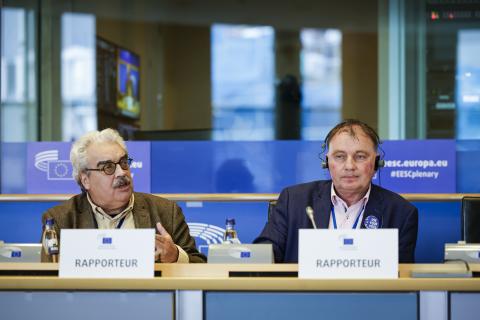European Economic
and Social Committee
2024 European elections – Public, pluralistic and independent information key to fighting new threats to democracy
With just a month to go until the European elections, the European Economic and Social Committee (EESC) warns European authorities of the urgent need to fight disinformation in order to safeguard democracy. Quality, independent journalism in a thriving pluralistic system remains the first bulwark against malicious campaigns and fake news.
The European Union needs an action plan to fight disinformation. The EU institutions and all the Member States must join forces to engage in a multi-factor strategy: firstly, all existing measures to fight disinformation must be stepped up and, secondly, the use of digital platforms by organised fake identities must be prevented.
According to Carlos Manuel Trindade, rapporteur for the opinion on Safeguarding Democracy Against Disinformation, adopted at the April plenary session, ‘Democratic society and our cosmopolitan way of life are being called into question. The extreme right and other extremist European forces and autocratic regimes in third countries are forging alliances to carry out disinformation campaigns that are undermining the European venture, and they are using social media and algorithms to do it. They are using technology as their main tool for this malicious campaign.’
Artificial intelligence is increasingly used to create disinformation
The EESC is concerned with the scope and spread of disinformation campaigns across the European Union ahead of the 2024 elections, and calls on the European institutions for an urgent reflection: the EU must identify the factors that still enable disinformation and misinformation to jeopardise free public speech and to instil a polarised debate in which hate prevails over factual information.
The rise of artificial intelligence (AI) has led to the development of new forms of disinformation and misinformation that use algorithms to mislead or to change the original meaning of something.
Using social media and digital platforms can also lead to addiction among vulnerable groups in our societies.
It is therefore important to assess these risks and regulate the commercial use of AI and algorithms so that people can freely decide whether to accept or reject certain algorithmic features.
In the words of John Comer, also rapporteur for the EESC opinion, ‘The most obvious way that disinformation distorts and undermines democratic debate is by convincing people to believe things that are untrue. Disinformation and misinformation are not new phenomena, but social media has revolutionised its spread. Deep fakes use AI to manipulate and generate visual and audio content with the potential to deliberately deceive millions of people by spreading fake news.’
Journalism must be classified as a European public good
The first defence against disinformation is quality journalism and pluralism. The EU institutions and Member States must take common action to ensure this, availing of all existing technological means to fight disinformation.
First of all, they must adopt a wide-ranging strategy which deals with all the various dangers we face: online, disinformation, hybrid threats and cybersecurity.
The strategy must be rolled out in full respect for our core democratic values, such as freedom of expression, the rule of law and people's fundamental rights, and must strike the right balance with respect to companies’ intellectual property rights. Private interests cannot override the public interest, and it is unacceptable for tech companies to turn manipulation and hate speech into profit.
A number of studies reveal that Europe has a problem with pluralism in the media. Journalists’ editorial freedom is essential, as are their safety and their access to sources of information. To ensure pluralism, the rights of independent media must be protected.
This is why the EESC is asking the European Commission to guarantee that information be available, independent of the business model crisis that is affecting our media. To guarantee that pluralism is not dependent on strict market rules, journalism must be classified as a European public good, as suggested by UNESCO.
With reference to media financing, the EESC calls for an adequately funded and independent public service media system. Public service media is essential, and must be publicly financed and independent of the government of the day.
On this matter, the Committee recommends creating a public European news channel, available on different platforms, in all national languages, and with an independent editorial commitment.
This would allow European people to access the information they need to make informed choices.
